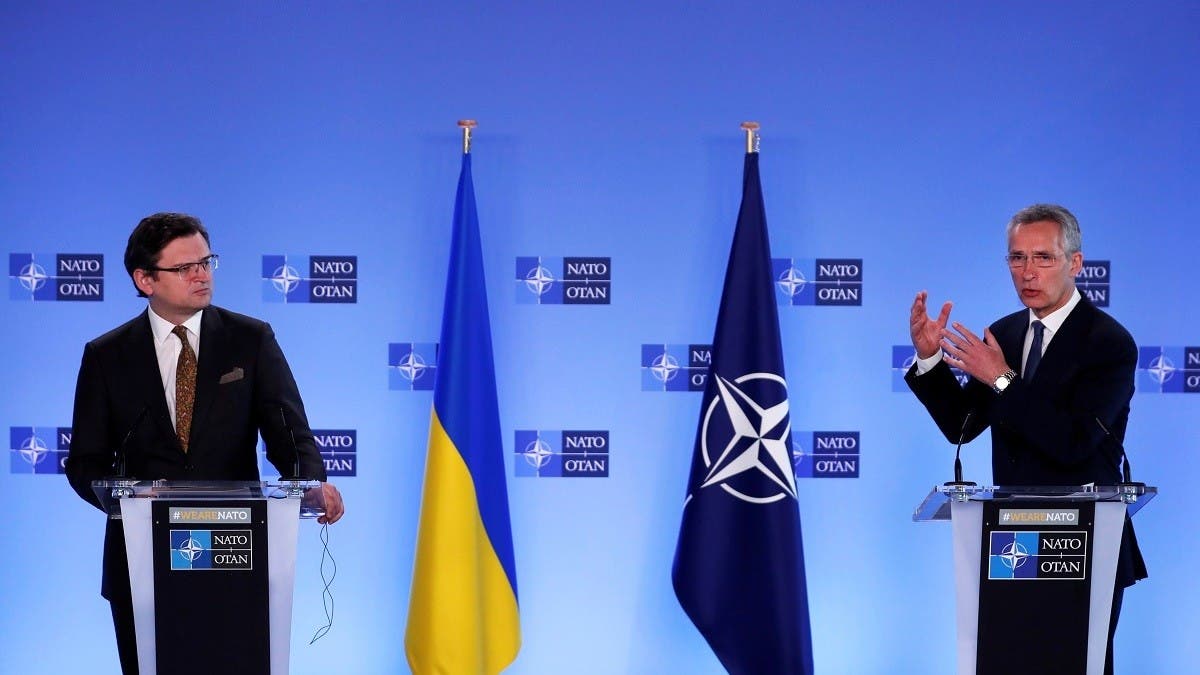Ukraine urged NATO on Wednesday to prepare economic sanctions on Russia to deter a possible invasion by tens of thousands of Russian troops concentrated within reach of its border.
Ukrainian Foreign Minister Dmytro Kuleba said he would make the request to NATO foreign ministers meeting for the second day in Latvia to discuss how to respond to the Russian build-up and avert potentially the most dangerous crisis in relations with Moscow since the Cold War.
For all the latest headlines follow our Google News channel online or via the app.
“We will call on the allies to join Ukraine in putting together a deterrence package,” Kuleba told reporters as he arrived for the talks in Riga.
This should include preparing economic sanctions against Russia, in case it “decides to chose the worst-case scenario”, Kuleba said, adding that NATO should also boost military and defense cooperation with Ukraine.
Ukraine is not a member of NATO but the US-led alliance has said it is committed to preserving the sovereignty of the former Soviet republic, which has tilted towards the West since 2014 and aspires to join both NATO and the European Union.
That has enraged Russia, drawing a warning from President Vladimir Putin on Tuesday that Russia was ready with a newly tested hypersonic weapon in case NATO crossed its “red lines” and deployed missiles in Ukraine.
Putin said on Wednesday that Moscow wanted serious negotiations with the United States and its allies to extract legal guarantees that would rule out “any further NATO moves to the east and the deployment of weapons systems that threaten us in close proximity to Russian territory.”
That is unlikely to be acceptable to the United States, which has said no country has the right to veto Ukraine’s NATO ambitions. US Secretary of State Antony Blinken is due to meet Russian Foreign Minister Sergei Lavrov in Stockholm on Thursday.
Separatist conflict
Russia also backs separatists in a long-running war in the Donbass region of eastern Ukraine and accused Kiev on Wednesday of mobilizing 125,000 troops, or half its army, in the conflict zone. Kiev declined to comment.
The Kremlin said it feared Ukraine was gearing up to try to take back the rebel areas by force – something Kiev denies – and accused it of “very dangerous adventurism.”
It said Russia could not take any steps to de-escalate because of a large concentration of Ukrainian forces close to the border.
Ukrainian President Volodymyr Zelenskiy said direct talks with Moscow were needed to end the war in the east, which Kiev says has killed more than 14,000 people.
“We must tell the truth that we will not be able to stop the war without direct negotiations with Russia, and today this has already been recognized by all, all external partners,” Zelenskiy told parliament.
Russia said it had started regular winter military drills in its southern military district, parts of which border Ukraine, and that 10,000 troops had relocated to training grounds across the huge area. Its ally Belarus has also announced joint military drills with Russia on the Ukrainian border.
Deterring Putin
The West has maintained economic sanctions on Russia’s energy, banking and defense sectors since 2014 after it seized the Black Sea peninsula of Crimea from Ukraine. It has also targeted a growing list of senior Russian officials with asset freezes and travel bans.
But Russia has also blunted the impact of sanctions by reducing its borrowings on foreign financial markets and maintaining large currency and gold reserves.
“We are confident that if we join efforts, if we act in a coordinated fashion, we will be able to deter President Putin and to demotivate him from choosing the worst-case scenario, which is a military operation,” Ukraine’s Kuleba said.
Danish Foreign Minister Jeppe Kofod told reporters any military operation that would violate the sovereignty of Ukraine would be met with “severe consequences” and that Denmark was ready to engage with heavy sanctions.
His comments echoed those of NATO and the United States, who on Tuesday issued stark warnings to Russia that it would pay a high price for any new military aggression against Ukraine.
The EU’s top diplomat, Josep Borrell, told reporters: “For the European Union, the territorial integrity and sovereignty of Ukraine is above anything. And we will be standing firmly and decisively with Ukraine in front of any attempt to undermine its territorial integrity and sovereignty.”
Read more:
Putin warns West: Moscow has ‘red line’ about Ukraine, NATO
Blinken to meet Russia’s Lavrov in Stockholm for talks on Ukraine
NATO chief warns Russia of ‘costs’ if it attempts to invade Ukraine

 World2 years ago
World2 years ago
 World2 years ago
World2 years ago
 Entertainment7 years ago
Entertainment7 years ago
 World7 years ago
World7 years ago
 Entertainment7 years ago
Entertainment7 years ago






